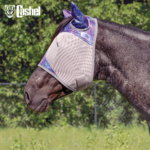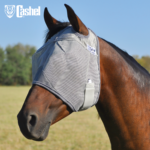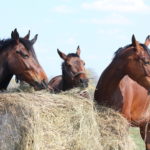Clean, fresh, palatable water should be available to the horse at all times. A mature, idle horse (500 kg) will require between 10 and 12 gallons of water per day, depending on environmental and/or physiological conditions.

Factors that change water consumption:
lactation
work
profuse sweating
environmental temperature
pregnancy
Pregnant mares require about 10 percent more water than nonpregnant mares. Lactating mares require 50 to 70 percent additional water to replace the water used in milk production. The water requirement for horses subjected to hard work will double due to water lost through sweat and respiration. Increases in ambient temperature will also cause the horse’s water requirement to double.
Before and during prolonged exercise, horses should be encouraged to consume as much water as possible to prevent dehydration. Following exercise, horses should be cooled down before drinking or have free access to water. Water consumed in large amounts by a hot horse after exercise can lead to colic, laminitis, or founder.
Automatic horse water bowls are useful because they provide a constant supply of water and decrease labor costs. Frequent cleaning of water buckets prevents horses from ingesting anything that may have fallen into them, such as feces. Cleaning also prevents algae or bacteria buildup on the walls of the bucket. Water temperature should range between 45?? to 65??F (7?? to 18??C), because horses will be reluctant to drink water that is too hot or too cold. In the winter, outside water should be checked regularly to make sure that it is not frozen. If horses are housed in box stalls, small water heaters may be used to prevent water from freezing.
From eXension HorseQuest.





